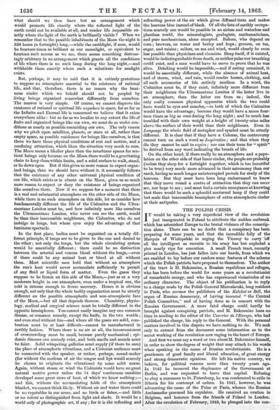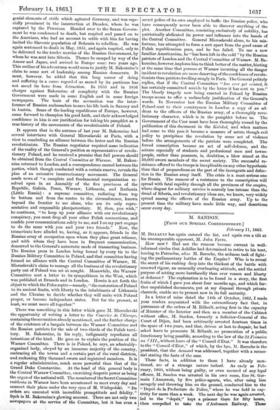THE POLISH CRISIS.
IT would be taking a very superficial view of the revolution just inaugurated in Poland to attribute the sudden outbreak which has astonished Europe to the brutal violence of the conscrip- tion alone. There can be no doubt that a conspiracy has been preparing for some years, and that the incredible folly of the Marquis of Wielopolski in urging the Viceroy to carry "Off all the intelligent as recruits to his army has but exploded a plot nearly ripe for execution. A small French tract, recently printed in London, has just fallen into our hands, from which we are enabled to lay before our readers some features of the scheme which the Polish patriots have proposed to themselves. The author of the tract is M. Bakounine, a Russian republican and ranee, who has been before the world for some years as a revolutionist of remarkable energy, and who has experienced vicissitudes of no ordinary character. The object of his publication is to reply to a charge made by the Polish General Mieroslavaki, long resident in Paris, who accuses the publishers of the Kolokol or Bell, the organ of Russian democracy, of having invented "the Central Polish Committee," and of having done so in concert with the Russian Government. A more fatal charge could hardly be brought against conspiring patriots, and M. Bakounine loses no time in sending to the editor of the Courrier de l'Europe, who had published the charge, his reply to the General. With the personal matters involved in this dispute we have nothing to do. We seek only to extract from the document some information as to the secret working of the revolution now raging in the heart of Europe.
And first we must say a word or two about M. Bakounine himself, in order to show the degree of weight that may attach to his words when speaking in the name of Russian revolutionists. He is a gentleman of good family and liberal education, of great energy and strong democratic opinions. He left his native country, we believe, for political reasons more than twenty years ago. In 1843 he incurred the displeasure of the Government at Berlin, and was requested to leave that capital. Refusing to obey a summons to St. Petersburg, he was condemned to exile in Siberia for his contempt of orders. In 1847, however, he was advocating the cause of the Poles at Paris, whence the Russian Ambassador procured his expulsion. He received an ovation in Belgium, and honours from the friends of Poland in London. After the revolution of February, 1848, he plunged into the con- genial elements of strife which agitated Germany, and was espe- cially prominent in the insurrection at Dresden, where he was captured by the Prussians. Handed over to the Saxon Govern- ment he was condemned to death, but respited and passed on to the Austrians, who had an account to settle with him for having incited the Slavonic population of Bohemia to rebellion. He was again sentenced to death in May, 1851, and again respited, only to be delivered to the tender mercies of the Russian Government, by whom he was sent into Siberia. Thence he escaped by way of the Amoor and Japan, and arrived in Europe some two years ago. This outline of his adventures would seem to justify M. Bakouuine's claim to some sort of leadership among Russian democrats. It must, however, be added that this long career of doing and suffering in a cause regarded as sacred by its partizans has not saved its hero from detraction. In 1853 and in 1856 charges against Bakounine of complicity with the Russian Government were made in some English and in some foreign newspapers. The basis of the accusation was the inter- ference of Russian ambassadors to save his life both in Saxony and in Austria. Some of the leading republicans of Europe, however, came forward to champion his good faith, and their acknowledged confidence in him is our justification for taking his pamphlet as a true history of the movements of the revolutionists of Poland.
It appears that in the autumn of last year M. Bakounine had several interviews with General Mieroslavski at Paris, with a view to concluding an alliance between the latter and the Russian revolutionists. The Russian negotiator required some indication of the reality of the General's position as representative of revolu- tionary Poland, and he received a promise that full powers should be obtained from the Central Committee at Warsaw. M. Bakou- nine returned to London, and a correspondence ensued between the parties, which though conducted with a certain reserve, reveals the plan of an extensive insurrectionary movement. The General sends news of "a complete and fundamental reorganization re- solved upon in an Assembly of the five provinces of the Republic, Galicia, Posen, Warsaw, Lithuania, and Ruthenia (Little Russia) : a supreme committee, radiating from top to bottom and from the centre to the circumference, known beyond the frontier to me alone, who am its only repre- sentative and responsible plenipotentiary. If, then, you wish," he continues, "to keep up your alliance with our revolutionary conspiracy, you must drop all your other Polish connections, and confide your communications solely to me, and I on my part engage to do the same with you and your two friends." Now, the triumvirate here alluded to, having, as it appears, friends in the Russian army of occupation upon whom they place great reliance, and with whom they have been in frequent communication, demurred to the General's autocratic mode of transacting business. The Russian press in London being bound by every tie to the Russian Military Committee in Poland, and that committee having formed an affiance with the Central Committee of Warsaw, M. Mieroslavski's claim to manage all the business of the revolutionary party out of Poland was set at nought. Meanwhile, the Warsaw Committee sent a letter to its sympathizers in the West, which was published at Brussels and in London. Herein is set forth the object to which the Poles aspire —namely, "the restoration of Poland to its ancient limits, with liberty to the inhabitants of Lithuania and the Ukraine to decide whether they will unite with Poland proper, or become independent states. But for the present, at least, we must move all together."
There was something in this letter which gave M. Mieroslavski the opportunity of writing a letter to the Courrier de l'Europe, containing the accusation already mentioned, and the further charge of the existence of a bargain between the Warsaw Committee and the Russian patriots for the sale of two-thirds of the Polish terri- tory. M. Bakounine, in his reply, indignantly repudiates all intentions of the kind. He goes on to explain the position of the Warsaw Committee. There is in Poland, he says, an admirably- organized body, obeyed by an immense majority of the country, embracing all the towns and a certain part of the rural districts, and reckoning fifty thousand sworn and registered members. It is a regular administration, much more powerful than that of the
Grand Duke Constantine. At the head. of this general body is the Central Warsaw Committee, exercising despotic power as being
the organ of the national will. The members of the Secret Committee
residents in Warsaw have been accustomed to meet every day and concoct their plans under the very eyes of M. Wielopolski. "its
orders are executed with incredible promptitude and fidelity." Such is M. Bakounine's glowing account. There are not only two newspapsra at the service of the Committee, but it has even a
secret police of its own employed to baffle the Russian police, who have consequently never been able to discover anything of the plot. Another Committee, consisting exclusively of nobility, has patriotically abdicated its power and influence into the hands of the Central Committee. General Mieroslavski alone, to his mis- fortune, has attempted to form a sect apart from the good cause of Polish republicanism pure, and he has failed. To use a now familiar Americanism, he "has been left in the cold "by the Russian patriots of London and the Central Committee of Warsaw. M. Ba- kounine, however, implores him to think better of the matter, hinting at the same time that persons at Warsaw incurring all the danger incident to revolution are more deserving of the confidence of revolu- tionists than patriots dwelling snugly in Paris. The General politely replies, that if the Central Committee "has ever yet existed, it has certainly committed suicide by the letter it has sent to you." The bloody tragedy now being enacted in Poland by Russian troops seems to offer a melancholy justification of the General's words. In November last the Russian Military Committee of Poland sent to their countrymen in London a copy of an ad- dress to the officers of the Russian army, of a thoroughly revo- lutionary character, which is in the pamphlet before us. The Government of the Czar must have been thoroughly roused by the publication of this document in the Kolokol, and when matters had come to this pass it became a measure of astute though evil policy to precipitate the revolution by some act of violence before the arrangements of the patriots were completed. The forced conscription became an act of self-defence, and the seizure especially of students and professional men and towns- people, rather than peasants, is, doubtless, a blow aimed at the 50,000 sworn members of the secret society. The successful re- sistance offered to the troops is inexplicable on any other hypothesis than that of preparedness on the part of the insurgents and defec- tion in the Russian army itself. The crisis is a most serious one for Russia. The rumour of a resistance to the conscription will spread with fatal rapidity through all the provinces of the empire,
where disgust for military service is scarcely less intense than the dread of Siberia, and revolutionary ideas are, we know, very widely spread among the officers of the Russian army. Up to the present time the military have made little way, and desertions occur every day.































 Previous page
Previous page